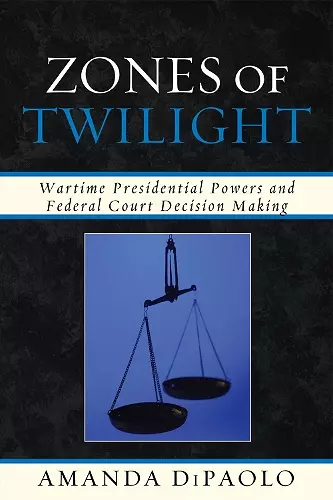Zones of Twilight
Wartime Presidential Powers and Federal Court Decision Making
Format:Paperback
Publisher:Lexington Books
Published:22nd Dec '09
Currently unavailable, and unfortunately no date known when it will be back
This paperback is available in another edition too:
- Hardback£102.00(9780739138335)

The Bill of Rights was designed to protect the American public from encroachments of liberty by the federal government. During times of war, the president often spearheads efforts to limit rights in the name of national security. When these cases make their way through the federal courts system, it is expected that the judiciary would use rights-based language in their adjudication of cases dealing with such rights-based claims. Zones of Twilight shows that the courts actually use the separation of powers to decide these cases. In other words, the courts look to see if Congress has authorized the president to limit the liberties in question. More often than not, if Congress is on board, so are the federal courts. Although the common conception is that the courts give the president a blank check during war, it is in fact Congress that has received that blank check. Zones of Twilight looks at four reoccurring issues during times of war where the courts have had to decide cases where the executive has limited individual freedoms: military detentions, warrantless electronic surveillance, emergency economic powers, and free speech.
DiPaolo (Middle Tennessee State Univ.) examines how federal courts rule when the national government has limited individual liberties during times of national emergency. Using Justice Robert Jackson's Youngstown Sheet & Tube v. Sawyer (1952) framework ina case law-based analysis, DiPaolo observes that in cases in which the president justifies his actions by claiming national security concerns, the federal courts will often opt not to rule on the larger constitutional issues at stake. Rather, they will evaluate the president's actions based on whether or not Congress has legislated. This 'separation of powers' approach, she suggests, protects the courts from bowing to the pressures of the moment and making a mistake that will, in the long run, weaken thejudiciary and the Constitution itself. DiPaolo's very thorough...case retellings are helpfully summarized by various tables that classify the decisions based on whether or not the court agreed with the chief executive's decision, and whether or not Congress had legislated in the particular subject area. Recommended. * CHOICE, September 2010 *
DiPaolo (Middle Tennessee State Univ.) examines how federal courts rule when the national government has limited individual liberties during times of national emergency. Using Justice Robert Jackson's Youngstown Sheet & Tube v. Sawyer (1952) framework in a case law-based analysis, DiPaolo observes that in cases in which the president justifies his actions by claiming national security concerns, the federal courts will often opt not to rule on the larger constitutional issues at stake. Rather, they will evaluate the president's actions based on whether or not Congress has legislated. This 'separation of powers' approach, she suggests, protects the courts from bowing to the pressures of the moment and making a mistake that will, in the long run, weaken the judiciary and the Constitution itself. DiPaolo's very thorough...case retellings are helpfully summarized by various tables that classify the decisions based on whether or not the court agreed with the chief executive's decision, and whether or not Congress had legislated in the particular subject area. Recommended. * CHOICE, September 2010 *
ISBN: 9780739138342
Dimensions: 232mm x 155mm x 18mm
Weight: 392g
262 pages